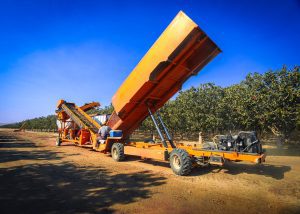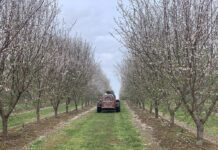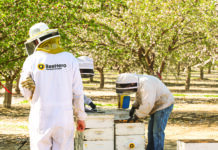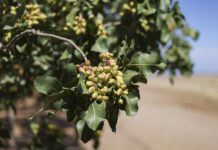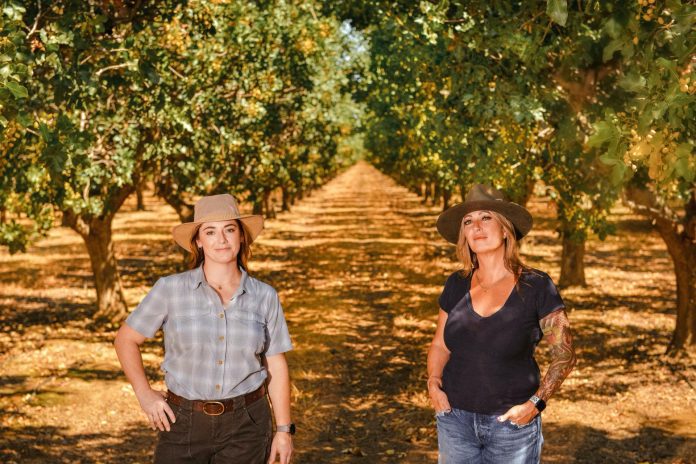
For generations, farms have been passed down from fathers to sons, but sisters Stephani Graham, owner of Sol Aureus Farms, and Rebecca Kaser, owner of Avellar-Moore Farm, reflect a trend of daughters taking over the family farming operation in the tree nut industry.
Graham and Kaser didn’t expect to become tree nut growers. Despite their dad planting his first pistachio trees in 1982, neither sister had farming at the top of their list of future careers. Avellar grew up on the farm, but Graham lived in Southern California with her mother and only spent time on the farm during visits with her dad.
Including the acreage from their dad’s company, Steve Moore Farms, the three farm 1,100 acres in central California with Graham growing pistachios and grapes and Kaser overseeing almond and pistachio orchards.
Graham and Kaser shared their unique experiences as sisters in the tree nut industry with West Coast Nut.
Q. Give us a little background on your decision to join the tree nut industry.
Rebecca: I’m a fourth-generation farmer. My grandfather grew wheat, and my uncle was in the cattle industry. Then our father invited us to join in the nut industry. Orchards were a whole new crop for us, and it was an opportunity to see where this would take us. I think it’s been fun, brought us all together.
Stephani: Rebecca’s family had a lot of ag background. I just had my dad’s half. My mom came from Chicago, so I didn’t have nearly the experience and exposure that Rebecca did.
Our father, Steve Moore, had cherries and almonds then planted pistachios in 1982. He planted his second block in 1995 and his last block in 2008. In 2012, our father offered up the opportunity to work in agriculture as a family group. We were both offered 160 acres to work with.
I didn’t have any experience with it. So, for me getting into it, I was thinking, ‘You know, this is generational information he doesn’t want to just disappear when he’s ready to retire.’ He wanted to pass it forward. So, for me, I was thinking, ‘This is a good opportunity to carry that forward.’
Q. What was the biggest challenge getting into the business without much in the way of an ag background?
Stephani: I think for me, it was just soaking up the information, getting the information, learning how it was applicable. There’s so much to it. You’ve got the different trimming of the trees, why you do it, what the biggest pests are that you want to avoid, how much water you need, how does the processing work. It took a while, at least for me, to get my head fully wrapped around what was involved in it, how those systems worked.
Rebecca: It was a lot for me even coming from an ag background. I kind of had the idea of what it was like to go through the phases and the seasons and how the industry, no matter how much effort you put into it, you could be affected by the weather. When I did come on board in 2012 with my degree in psychology, I ended up going back to school to learn accounting and business so that I could have a better grasp on how to manage the farm.
Q. Tell us a little bit about how your businesses work together.
Rebecca: When we first came on board, my dad delegated parcels out to both Stephani and I to operate and manage and from there we grew to add on additional acreage and additional crops to farm and manage as well. We started out under our father’s company, and then from there, we split off into our own individual entities for which we are the sole owners and operators, but we still operate under the family farm. We kind of have the best of both worlds.
Stephani: It was something that was done over time, which was good because as we learned what we were doing, more and more was turned over until now we have all established these separate entities but still operate together as a group.
Q. What challenges do you think the nut industry faces?
Stephani: Water is at the top of the list. Overhead costs and budgeting are next, and last but not least is how to continue growing in a state that has a lot of challenges and climate-based changes.
Rebecca: Managing water is a challenge. With SGMA, the whole state was divided into groundwater sustainability agencies (GSAs) which would manage the underground aquifers. Minimum thresholds were established by the GSAs and are implemented on us through a groundwater sustainability plan. From there, we’ve had to reduce our planted acreage in order to move water around to keep our existing plantings irrigated. It has made for a reduction in total crop size for the state of California.
Q. How have your growing practices evolved?
Rebecca: We’re utilizing newer technologies. We’ve outfitted a lot of our tractors with GPS to assist with driving them. We also use orchard mapping where they fly over, and they can look at the different zones of the trees where they’re being stressed from lack of irrigation. We also use individualized plant stress monitors and dendrometers to measure at the plant level what nutrient deficiencies or irrigation deficiencies are there. It all coalesces into this digitized map that you can pull up on your phone and make these real-time decisions based upon real-time data.
Q. What makes you hopeful about the future of the tree nut industry?
Rebecca: This is a great industry to be in. I’m excited because we’re producing a healthy product that’s natural, and we can provide it to others to maintain a healthy lifestyle. I’m excited to be able to participate in a voluntary commodity organization like American Pistachio Growers that helps support our efforts in nutrition research and marketing so that it can increase public awareness of this heart-healthy, plant-based protein.
Stephani: I agree 100%. It feels good to be a part of the solution nutritionally. My hope is that we can continue doing that, which is a big challenge with what we’ve got going on with our legislation with the water situation that has put a lot of demand on growers and is really stressing farmers’ ability to continue. A lot of multi-generational farms have had to stop farming because of that. So, I’m really hopeful that we can come to some solution on all of these different areas so that we can all continue growing and providing that healthy food.
Q. What do you think needs to happen to keep multi-generational farms in business?
Stephani: Well, we need to get water. We need to come to some sort of arrangement, whether it’s water storage or recharging the aquifers. We need to get that into a structured set where farmers can continue. That’s a big problem, and we need our legislators and lobbyists up at the Capitol and in the country aware of what’s going on and what the need is.
Q. What would you say are the biggest assets of the tree nut industry in California?
Rebecca: I think it’s the community of growers. We’re able to come together and produce great products up and down the state. It’s the community of growers that come together for our commodity boards, the Almond Board, the American Pistachio Growers. We get together, and we all network and share ideas and use our resources to find research to really extol the benefits of the products that we’re growing and to really show the value of our product.
Stephani: Another strength is our resources. We’ve got programs out there that help existing and new growers to learn. There’s the Lead On program through American Pistachio Growers. They have all these different avenues to come together to help educate and inform and keep everybody on the same level of understanding of what’s going on and what needs to happen to keep it all going.
Q. What advice would you give to other women looking to get into the tree nut industry?
Rebecca: Network with others. Don’t let anybody stop you. Make friends.
Stephani: Develop a thick skin and don’t be afraid to speak up. As with any industry for women, you’ve got your people that are going to be a little more antiquated, but honestly, it hasn’t been too much of that. We have had a pretty good response, especially out of the younger growers. I mean, there are more women in agriculture now. I think a lot of people aren’t aware of it, but it’s becoming more of a thing now, which is really great. Over the past 12 years, I have witnessed a vast improvement in acceptance and attitude toward women. Press forward and don’t look back.
Q. What is your proudest achievement as it relates to your professional development?
Rebecca: We’ve come together with other groups of growers to build groundwater recharge projects on our farm sites. It has helped us to be more sustainable in our practices, and what’s good for the crop is good for the soil. These groundwater recharge projects that we’ve been doing locally have also helped secure water for a small ag community near our orchards, and it’s provided some water security for the people that live there. So, it’s not just good for us and our farm. It has also been good for the neighboring community as well.
Stephani: It’s being a part of the solution versus the problem, and it’s great that we have in our district a lot of effort putting these plans together. Almost every week or every two weeks they meet and constantly go through, discuss, talk, work on all of these things as they’re changing because it’s that fast. It feels good that we’re a part of a group that is dedicated to helping that.
Q. Tell us a little bit more about the groundwater recharge project on your farm.
Rebecca: On our farm, we created two flood MARs (flood-managed aquifer recharge). We basically bermed and terraced our sections of land, then we installed perforated pipe around the perimeter which allowed water to naturally percolate down into the groundwater basin. We’ve utilized those open, fallow fields because we have open, fallow fields now and used them for another purpose of recharging that groundwater.
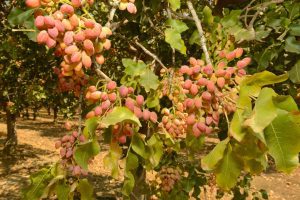
Q. In what ways do you give back to the industry?
Rebecca: We both participate. I go to a lot of our water district meetings and provide input to help drive some change in the policies within our water district. And both Stephani and I participate in our pistachio commodity board through committees to help drive membership, drive research and marketing. And that’s where we’ve been able to make an impact. We’ve been in this long enough to where we can actually see from where we started to where we’re going, and it’s pretty cool to have that.
Stephani: The Lead On program created by American Pistachio Growers. We donate toward the education and knowledge base for new growers. This program is held every year.
Q. Who would you say was the biggest influence or mentor in your career?
Stephani: For myself, I don’t have just one. We learned quite a bit from our father, watching what he did. The information he’s passed down to us, that’s been a big influence. I have to mention Bob Beede because he’s a real fun gentleman who is now retired but still participates in pistachio management tests. He’s a professor emeritus of UC Cooperative Extension, and he made it enjoyable to get the information.
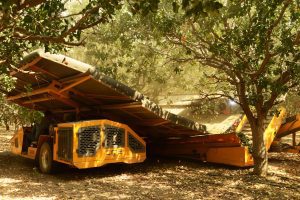
Rebecca: And also, our first ranch manager, Gary Robinson. When we first got into pistachios, I remember meeting him for the first time, and I was asking him for some direction, a ‘leaping off’ point. Where do I need to get started in my education of becoming a pistachio grower? And he said, “Learn about water. Without water, you’re not going to have a crop.” From there, it really gave me a starting point, and I think that’s really driven me since then.
Q. Talk about how you work together as sisters.
Rebecca: We have a really good setup. It’s kind of the best of both worlds because we have each other as a resource. We can bounce ideas off each other, and we both have unique styles of managing our businesses. We’ve been able to utilize that to see what works and what doesn’t, and it’s only been beneficial to us both.
Stephani: In the beginning, the fun part that I think was really helpful is we’ve got our father’s set of information and there was mine because I’m older. I was in the workforce for 26 years prior to doing this and then Rebecca was coming in new. So, we literally covered three balanced areas of knowledge and generational information and creativity. It was great because you get three different viewpoints to bring to the table.
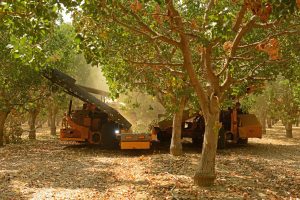
Q. How are changing weather patterns affecting how you farm?
Rebecca: This time last year, we were thinking we were going to have another dry year, so we were all planning for that. Then we got our first pineapple express. Then another pineapple express came along, and we started to realize that all the reservoirs were starting to fill up. Then we had all this snowpack, and a lot of the growers in our area started talking about not only are we going to have a larger-than-expected surface water allocation, but we had to figure out how to best manage all these floodwaters coming through the local rivers and through the delta.
And that’s when we came up with terracing and putting up the berms to start recharging, so we wouldn’t have any spillage in any of our reservoirs. With changing weather patterns, I think it’s a testament to the resiliency of the farmer, being able to think on the spot and the ingenuity which goes into each season.
Stephani: Remain adaptable.
